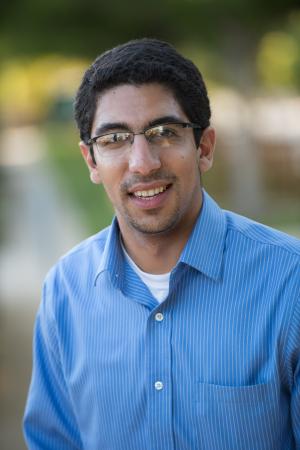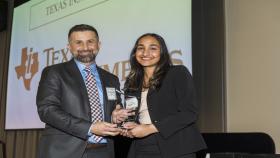According to his 160-character bio on Twitter, undergraduate researcher Mohamad Ali Najia dreams of one day becoming the director of the National Institutes of Health. As an Amgen Scholar at UC Berkeley, Najia’s trek along what he describes as his “non-linear path” to achieving his goal is well underway.
Najia is set to graduate from Georgia Tech’s Coulter Department of Biomedical Engineering this December, which will put the finishing touch on a long resume of successful research ventures in his undergraduate career. Since he was a freshman, Najia has been working in Dr. Todd McDevitt’s Engineering Stem Cell Technologies Lab to learn more about engineering the microenvironment in which stem cells live.
“This research has real-world implications in developing stem cell-based therapeutics,” Najia explains. “Stem cells, like any other raw material, must be processed in order to realize their potential. My job is to investigate and design the platforms necessary to manufacture these stem cells on a large scale.”
In the summer of 2013, Najia worked with Dr. Alexander Gimelbrant at Harvard Medical School to investigate how cells become functionally distinct, and the epigenetic mechanisms that govern embryonic development. In October of that year, his work was published in the journal Biotechnology and Bioengineering.
This past summer Najia continued on his quest to further understand embryonic development, albeit on the other side of the country.
“I spent the summer working in Dr. Michael Eisen’s lab at UC Berkeley, investigating the fundamental biological mechanisms that dictate the cadence of embryogenesis,” Najia said.
“After graduation, I hope to continue to pursue this field of research in graduate school to earn my Ph.D. in biomedical engineering.”
From his early school years growing up on the North Shore of Massachusetts, Najia has been interested in engineering–though not the kind that currently fills his days.
“I dreamed of becoming a civil engineer, because I loved to build things with Legos and wood,” Najia remembers.
It wasn’t until his sophomore year of high school that he began to take an interest in biomedical engineering and its implications. Najia studied Nobel prize-winning scientist Shinya Yamanaka and his revolutionary work reprogramming human skin cells to stem cells.
“It was truly fascinating to me, and the more I learned about the subject, the more my hunger for knowledge grew,” Najia said. “The teachers, professors and mentors I’ve had in the years since then have helped guide and shape my interest in a career in biomedical research.”
Najia credits his time spent as a teaching assistant at Georgia Tech with helping him fine-tune his career goals. For the past three years he’s guided other students through the notoriously difficult Computing for Engineers, which has proved a rewarding opportunity to see his field in a new light.
“I think I may have learned more as a teaching assistant than as a student, because teaching forces you to think creatively and fundamentally about the subject matter,” Najia said. “The ability to play a role in a student’s exploration of a subject and see their growth firsthand is extremely satisfying.”
It’s why–in addition to goal of becoming the principal investigator in his own laboratory–Najia aspires to continue teaching.
Najia maintains a prominent leadership role on campus, as editor-in-chief of the Tower undergraduate research journal. He says it’s a challenging but important task to translate science findings into a format the general public can understand, and believes all scientists should place a larger emphasis on communicating their findings and shaping science policy in the U.S. Hence, his mission to work at the NIH.
“The responsibility falls on all of us in the sciences to effectively explain our research, and not just in technical journals,” Najia said. “It’s up to us to convey why our research matters and inspire the next generation of scientists who will advance on the building blocks we leave for them.”
Najia may be a young researcher himself, but he already possesses valuable wisdom to impart to newer BME students. Exploring as many interests as possible, he says, is the best way to not only nail down your career goals but to keep your mind sharp.
“Even if you have an idea of what it is you want to do, experiencing new things and meeting as many supportive mentors as possible will help you along your unique path to success,” he said. “My various research internships along with the talented faculty and staff at Georgia Tech have helped me immensely, and have no doubt pointed me in a direction to achieve my goals.”
Connect with Mohamad Ali Najia on LinkedIn
Follow Mohamad Ali Najia on Twitter
Written by Chris Calleri
Media Contact
Chris Calleri
Communications Manager
Wallace H. Coulter Department of Biomedical Engineering
Georgia Institute of Technology & Emory School of Medicine
313 Ferst Drive, Suite 2120
Atlanta, GA 30332-0535
Phone: 404.385.2416
Keywords
Latest BME News
Jo honored for his impact on science and mentorship
The department rises to the top in biomedical engineering programs for undergraduate education.
Commercialization program in Coulter BME announces project teams who will receive support to get their research to market.
Courses in the Wallace H. Coulter Department of Biomedical Engineering are being reformatted to incorporate AI and machine learning so students are prepared for a data-driven biotech sector.
Influenced by her mother's journey in engineering, Sriya Surapaneni hopes to inspire other young women in the field.
Coulter BME Professor Earns Tenure, Eyes Future of Innovation in Health and Medicine
The grant will fund the development of cutting-edge technology that could detect colorectal cancer through a simple breath test
The surgical support device landed Coulter BME its 4th consecutive win for the College of Engineering competition.








